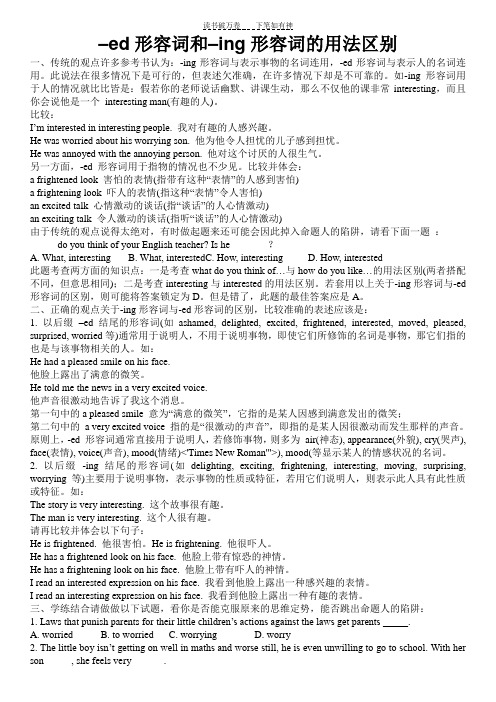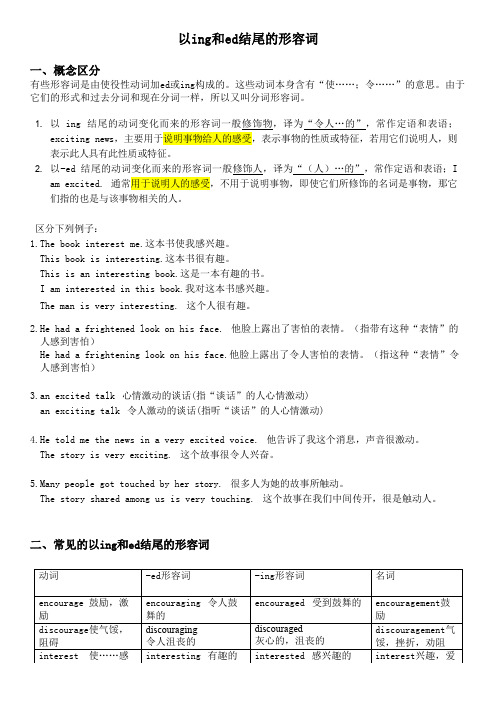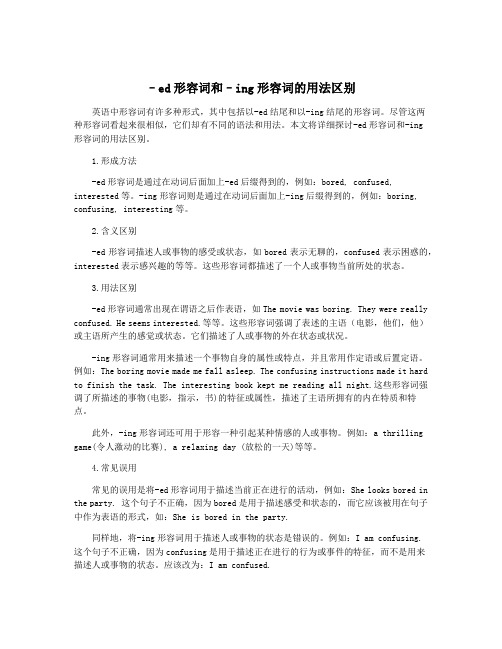以ed和ing结尾的形容词汇总
ed形容词和ing形容词

–ed形容词和–ing形容词的用法区别一、传统的观点许多参考书认为:-ing形容词与表示事物的名词连用,-ed形容词与表示人的名词连用。
此说法在很多情况下是可行的,但表述欠准确,在许多情况下却是不可靠的。
如-ing 形容词用于人的情况就比比皆是:假若你的老师说话幽默、讲课生动,那么不仅他的课非常interesting,而且你会说他是一个interesting man(有趣的人)。
比较:I’m interested in interesting people. 我对有趣的人感兴趣。
He was worried about his worrying son. 他为他令人担忧的儿子感到担忧。
He was annoyed with the annoying person. 他对这个讨厌的人很生气。
另一方面,-ed 形容词用于指物的情况也不少见。
比较并体会:a frightened look 害怕的表情(指带有这种“表情”的人感到害怕)a frightening look 吓人的表情(指这种“表情”令人害怕)an excited talk 心情激动的谈话(指“谈话”的人心情激动)an exciting talk 令人激动的谈话(指听“谈话”的人心情激动)由于传统的观点说得太绝对,有时做起题来还可能会因此掉入命题人的陷阱,请看下面一题:_____ do you think of your English teacher? Is he _______?A. What, interestingB. What, interestedC. How, interestingD. How, interested此题考查两方面的知识点:一是考查what do you think of…与how do you like…的用法区别(两者搭配不同,但意思相同);二是考查interesting与interested的用法区别。
ed形容词和ing形容词

–ed形容词和–ing形容词的用法区别1,以后缀–ed结尾的形容词(如ashamed, delighted, excited, frightened, interested, moved, pleased, surprised, worried等)通常用于说明人,不用于说明事物,即使它们所修饰的名词是事物,那它们指的也是与该事物相关的人。
如:He had a pleased smile on his face.他脸上露出了满意的微笑。
He told me the news in a very excited voice.他声音很激动地告诉了我这个消息。
原则上,-ed 形容词通常直接用于说明人,若修饰事物,则多为air(神态), appearance(外貌), cry(哭声), face(表情), voice(声音), mood(情绪)等显示某人的情感状况的名词。
2. 以后缀-ing 结尾的形容词(如delighting, exciting, frightening, interesting, moving, surprising, worrying 等)主要用于说明事物,表示事物的性质或特征,若用它们说明人,则表示此人具有此性质或特征。
如:The story is very interesting. 这个故事很有趣。
The man is very interesting. 这个人很有趣。
请再比较并体会以下句子:He is frightened. 他很害怕。
He is frightening. 他很吓人。
He has a frightened look on his face. 他脸上带有惊恐的神情。
He has a frightening look on his face. 他脸上带有吓人的神情。
I read an interested expression on his face. 我看到他脸上露出一种感兴趣的表情。
高中英语ing和ed结尾的形容词辨析(答案不全)

以ing和ed结尾的形容词一、概念区分有些形容词是由使役性动词加ed或ing构成的。
这些动词本身含有“使……;令……”的意思。
由于它们的形式和过去分词和现在分词一样,所以又叫分词形容词。
1. 以 ing 结尾的动词变化而来的形容词一般修饰物,译为“令人…的”,常作定语和表语;exciting news,主要用于说明事物给人的感受,表示事物的性质或特征,若用它们说明人,则表示此人具有此性质或特征。
2. 以-ed 结尾的动词变化而来的形容词一般修饰人,译为“(人)…的”,常作定语和表语;Iam excited. 通常用于说明人的感受,不用于说明事物,即使它们所修饰的名词是事物,那它们指的也是与该事物相关的人。
区分下列例子:1.The book interest me.这本书使我感兴趣。
This book is interesting.这本书很有趣。
This is an interesting book.这是一本有趣的书。
I am interested in this book.我对这本书感兴趣。
The man is very interesting. 这个人很有趣。
2.He had a frightened look on his face. 他脸上露出了害怕的表情。
(指带有这种“表情”的人感到害怕)He had a frightening look on his face.他脸上露出了令人害怕的表情。
(指这种“表情”令人感到害怕)3.an excited talk 心情激动的谈话(指“谈话”的人心情激动)an exciting talk 令人激动的谈话(指听“谈话”的人心情激动)4.He told me the news in a very excited voice. 他告诉了我这个消息,声音很激动。
The story is very exciting. 这个故事很令人兴奋。
5.Many people got touched by her story. 很多人为她的故事所触动。
ed形容词和ing形容词

–ed形容词和–ing形容词的用法区别一、传统的观点许多参考书认为:-ing形容词与表示事物的名词连用,-ed形容词与表示人的名词连用。
此说法在很多情况下是可行的,但表述欠准确,在许多情况下却是不可靠的。
如-ing 形容词用于人的情况就比比皆是:假若你的老师说话幽默、讲课生动,那么不仅他的课非常interesting,而且你会说他是一个interesting man(有趣的人)。
比较:I’m interested in interesting people. 我对有趣的人感兴趣。
He was worried about his worrying son. 他为他令人担忧的儿子感到担忧。
He was annoyed with the annoying person. 他对这个讨厌的人很生气。
另一方面,-ed 形容词用于指物的情况也不少见。
比较并体会:a frightened look 害怕的表情(指带有这种“表情”的人感到害怕)a frightening look 吓人的表情(指这种“表情”令人害怕)an excited talk 心情激动的谈话(指“谈话”的人心情激动)an exciting talk 令人激动的谈话(指听“谈话”的人心情激动)由于传统的观点说得太绝对,有时做起题来还可能会因此掉入命题人的陷阱,请看下面一题:_____ do you think of your English teacher? Is he _______?A. What, interestingB. What, interestedC. How, interestingD. How, interested此题考查两方面的知识点:一是考查what do you think of…与how do you like…的用法区别(两者搭配不同,但意思相同);二是考查interesting与interested的用法区别。
–ed形容词和–ing形容词的用法区别

–ed形容词和–ing形容词的用法区别英语中形容词有许多种形式,其中包括以-ed结尾和以-ing结尾的形容词。
尽管这两种形容词看起来很相似,它们却有不同的语法和用法。
本文将详细探讨-ed形容词和-ing形容词的用法区别。
1.形成方法-ed形容词是通过在动词后面加上-ed后缀得到的,例如:bored, confused, interested等。
-ing形容词则是通过在动词后面加上-ing后缀得到的,例如:boring, confusing, interesting等。
2.含义区别-ed形容词描述人或事物的感受或状态,如bored表示无聊的,confused表示困惑的,interested表示感兴趣的等等。
这些形容词都描述了一个人或事物当前所处的状态。
3.用法区别-ed形容词通常出现在谓语之后作表语,如The movie was boring. They were really confused. He seems interested.等等。
这些形容词强调了表述的主语(电影,他们,他)或主语所产生的感觉或状态。
它们描述了人或事物的外在状态或状况。
-ing形容词通常用来描述一个事物自身的属性或特点,并且常用作定语或后置定语。
例如:The boring movie made me fall asleep. The confusing instructions made it hard to finish the task. The interesting book kept me reading all night.这些形容词强调了所描述的事物(电影,指示,书)的特征或属性,描述了主语所拥有的内在特质和特点。
此外,-ing形容词还可用于形容一种引起某种情感的人或事物。
例如:a thrilling game(令人激动的比赛), a relaxing day (放松的一天)等等。
4.常见误用常见的误用是将-ed形容词用于描述当前正在进行的活动,例如:She looks bored in the party. 这个句子不正确,因为bored是用于描述感受和状态的,而它应该被用在句子中作为表语的形式,如:She is bored in the party.同样地,将-ing形容词用于描述人或事物的状态是错误的。
以ed或ing结尾的形容词课件

2. The ______ news ______ Jim. He was _____ at it. A. surprising; surprised; surprised B. surprised; surprised; surprising C. surprised; surprising; surprised D. surprised; surprising; surprising
look on his face. (disappoint)
4. All of us were _p_u_z_z_le_d_ by the _p_u_z_z_l_in_g_ maths problem. (puzzle)
5. _B_o_r_e_d_ of the _b_o_r_in_g_ film, the f way. (bore)
A. disappointing B. disappointed
C. surprising
D. pleased
Mr. Smith,_____ of the_____ speech, started to read a novel. (03北京春季) A.tired; boring B.tiring; bored C.tired; bored D.tiring; boring
Exercises I
1. The situation is more ____than ever. I’m _____ about what to do next. A. puzzled; puzzled B. puzzling; puzzling C. puzzling; puzzled D. puzzled; puzzling
7)There is an__e_x_c_it_e_d____(excite) look/
高中英语外研版必修一《Section ⅡGrammar——现在时态和以-ing与-ed结尾的形容词》

ow to pronounce (pronunciation) this word? 8.The whole family were having a happy get-together wh
(disappoint) 9.When hearing the surprising news that Michael Jackso
n passed away they were surprised to look at each other. (surprise)
10.He was worried about his son.(worry)
二、现在进行时 1.表示说话时正在发生着的一个动作。 The students are listening to the teacher carefully. 学生们正在认真地听老师讲课。 温馨提示 时间状语为 now at present at the moment; at nine o'clock 等;有时还可以有像 look,listen 等提示语。
not just survival. 4.Her explanation (explain)did not satisfy the teacher.
5.He speaks English and French with equal fluency (flue nt).
6.A misunderstanding (understand) was the beginning of
外研版 高中英语 必修一
Section Ⅱ Grammar—— 现在时态和以ing与ed结尾的形容词
以ed和ing结尾的形容词的比较级

以ed和ing结尾的形容词的比较级
以ed和ing结尾的形容词的比较级,大多数是双音节和多音节词,比较级前加more,最高级前面加most.
扩展资料
英语形容词比较级和最高级变化规则:
1、一般情况下,直接在形容词后加er或est.
如: tall–taller–tallest;
2、以不发音的e结尾的形容词,直接在其后加r或st.
如: nice –nicer –nicest;
3、结尾只有一个元音字母和一个辅音字母的(或以辅音+元音+辅音字母结尾的),双写最后的一个辅音字母,再加er或est.
如: thin–thinner–thinnest;
4、以“辅音字母+y”结尾的形容词,变y为i再加er或est.
如: happy–happier–happiest;
5、多音节词,比较级前加more,最高级前面加most.
如: beautiful–more beautiful–most beautiful;
6、特殊情况.
如: good(好的)–better(更…)–best(最…);
many/much(许多的)–more(更多的.)–most(最多的);
bad/ill(坏的,病的)–worse(更坏的)–worst(最坏的);
little(小的,很少的)–less(更少的,更小的)–least(最小的,最少的).。
- 1、下载文档前请自行甄别文档内容的完整性,平台不提供额外的编辑、内容补充、找答案等附加服务。
- 2、"仅部分预览"的文档,不可在线预览部分如存在完整性等问题,可反馈申请退款(可完整预览的文档不适用该条件!)。
- 3、如文档侵犯您的权益,请联系客服反馈,我们会尽快为您处理(人工客服工作时间:9:00-18:30)。
以ed和ing结尾的形容词汇总
以ed和ing结尾的形容词:
1. amazing adj. 令人惊异的;惊人的
amazed adj. 感到惊奇的;惊讶的
2. amusing adj. 引人发笑的;有趣的
amused adj. 被逗笑的;愉快的
3. astonishing adj. 使人吃惊的
astonished adj. 惊讶的;吃惊的
扩展资料
以-ing和-ed结尾形容词的区别用法:
1. 以后缀-ed结尾的形容词,如ashamed, delighted, excited, frightened, interested, moved, pleased, surprised, worried等,一般用来形容人的感受,表示“感到......的”,作表语。
如:He had a pleased smile on his face. 他脸上露出了满意的微笑。
He told me the news in a very excited voice. 他告诉了我这个消息,声音很激动。
第一句中的a pleased smile 意为“满意的微笑”,它指的是某人因感到满意发出的微笑;第二句中的 excited voice 指的是“激动的声音”,即指的是带有这种声音的某人感到激动。
原则上,-ed 形容词通常直接用于说明人,若修饰事物,则多为air(神态), appearance(外貌), cry(哭声), face(表情), voice(声音), mood(情绪)等与显示某人的情感状况的名词。
2. 以后缀-ing结尾的形容词,如delighting, exciting, frightening, interesting, moving, surprising, worrying 等,一般用来形容事或物本身具有的性质,表示“令人......的”,作表语或定语。
如:
The story is very interesting. 这个故事很有趣。
The man is very interesting. 这个人很有趣。
3、常见的v.-ing,v.-ed词及短语总结如下:
exciting令人兴奋的 excited感到激动的 be excited about对......感到激动
surprising 令人惊奇的surprised感到好奇的be surprised at 对......感到惊奇
amazing令人惊讶的. amazed感到惊讶的 be amazed at对......感到惊讶
tiring 令人厌倦的 tired感到厌烦的 be tired of对......感到厌烦
annoying令人生气的 annoied感到生气的 beannoied with生......的气
worrying令人担心的worried感到担心的be worried about 为......担心
encourage 令人鼓舞的 encouraged 受到鼓舞的
interesting 有趣的 interested 感兴趣的
astonishing令人惊呆的 astonished 惊呆的
moving 令人感动的 moved 感动的
frightening令人害怕的 frightened害怕的
terrifying令人恐惧 terrified感到恐惧的
puzzling 令人困惑不解的 puzzled感到困惑的
satisfying令人满意的 satisfied感到满意的
boring 令人讨厌的 bored感到厌烦的
touching 触动人心的 touched感动的
embarrassing令人尴尬的 embarrassed尴尬的。
